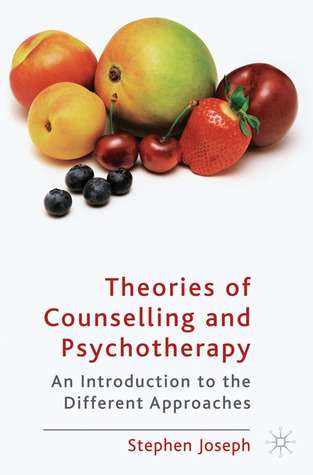This authoritative overview of the main approaches to counselling and psychotherapy offers a uniquely concise and systematic framework for understanding and comparing different models of working. Bringing together the philosophical and practical elements of a wide range of psychological therapies, Stephen Joseph examines the assumptions and values that underpin different u
This authoritative overview of the main approaches to counselling and psychotherapy offers a uniquely concise and systematic framework for understanding and comparing different models of working. Bringing together the philosophical and practical elements of a wide range of psychological therapies, Stephen Joseph examines the assumptions and values that underpin different understandings of mental distress and the various approaches to psychological assessment and treatment. He sets his discussion in the context of the contemporary drive towards evidence-based practice. In particular, he:shows how the psychological therapies are affected by philosophy and theory brings together psychodynamic, cognitive-behavioural and humanistic ideas in one clear and easily navigable structure features well-chosen case studies that are revisited in each theoretical model
includes handy summary charts, new ‘topics for reflection’, and a full glossary.This is a versatile and approachable text which offers an essential starting-point for students on counselling and psychotherapy courses; those training to work in psychological therapy services; or students taking counselling psychology, clinical psychology or mental health courses at advanced and postgraduate level.
…more
Select Your Cookie Preferences
We use cookies and similar tools that are necessary to enable you to make purchases, to enhance your shopping experiences and to provide our services, as detailed in our Cookie Notice. We also use these cookies to understand how customers use our services (for example, by measuring site visits) so we can make improvements.
If you agree, we’ll also use cookies to complement your shopping experience across the Amazon stores as described in our Cookie Notice. This includes using first- and third-party cookies, which store or access standard device information such as a unique identifier. Third parties use cookies for their purposes of displaying and measuring personalised ads, generating audience insights, and developing and improving products. Click ‘Customise Cookies’ to decline these cookies, make more detailed choices, or learn more. You can change your choices at any time by visiting Cookie Preferences, as described in the Cookie Notice. To learn more about how and for what purposes Amazon uses personal information (such as Amazon Store order history), please visit our Privacy Notice.
Sorry, there was a problem saving your cookie preferences. Try again.
By Charles “Rip” McAdams, Ed.D.
Professor and Chair, School Psychology and Counselor Education
William & Mary
Professional counselors apply a variety of clinical approaches in their work, and there are hundreds of clinical counseling approaches to choose from. The most recent edition of The SAGE Encyclopedia of Theory in Counseling and Psychotherapy lists over 300 different approaches to counseling practice.1 So how do counselors come to know what approach is the right one for them? To answer that question, it is first necessary to understand that no one counseling approach is better than the rest. That is because counseling approaches are based upon theories about human function and change as opposed to hard evidence.
Determining whether one counseling approach works better than another is difficult, because there are so many variables to consider in the counseling process. For example, if we try to compare the effectiveness of two counselors applying the same theoretical model, there can be major differences in the counseling outcome due to differences in the clients’ histories and situations, differences in the counselors’ communication styles, and even differences in client and counselor mood on the day of the comparison.
Such differences are hard to control for experimentally, thus making it almost impossible to prove that one approach to counseling is the absolute best way. Without such proof, it becomes the responsibility of counselors to do all they can to see that the treatment model(s) they apply are the best ones to address each client’s needs. That responsibility starts with becoming familiar with the models that have shown to be most beneficial in actual practice.
Fortunately, almost all of the many individual theoretical models of counseling fall into one or more of six major theoretical categories: humanistic, cognitive, behavioral, psychoanalytic, constructionist and systemic.
Counseling Theories: Exploring 6 Major Theoretical Categories
Humanistic: Humanistic counseling theories hold that people have within themselves all the resources they need to live healthy and functional lives, and that problems occur as a result of restricted or unavailable problem-solving resources. Humanistic counselors see their role not as one of directing clients in how to address their problems but, rather, as one of helping clients to discover and access within themselves the restricted resources they need to solve problems on their own. Some currently preferred humanistic counseling therapies include person-centered, existential, emotion-focused, Gestalt and positive psychology.
Cognitive: Cognitive counseling theories hold that people experience psychological and emotional difficulties when their thinking is out of sync with reality. When this distorted or “faulty” thinking is applied to problem-solving, the result understandably leads to faulty solutions. Cognitive counselors work to challenge their clients’ faulty thinking patterns so clients are able to derive solutions that accurately address the problems they are experiencing. Currently preferred cognitive-theory-based therapies include cognitive behavior therapy, reality therapy, motivational interviewing, and acceptance and commitment therapy.
Behavioral: Behavioral counseling theories hold that people engage in problematic thinking and behavior when their environment supports it. When an environment reinforces or encourages these problems, they will continue to occur. Behavioral counselors work to help clients identify the reinforcements that are supporting problematic patterns of thinking and acting and replace them with alternative reinforcements for more desirable patterns. Currently preferred therapies based in behavior theory include behavior therapy, dialectical behavior therapy, multimodal therapy and conjoint sex therapy.
Psychoanalytic: Psychoanalytic counseling theories hold that psychological problems result from the present-day influence of unconscious psychological drives or motivations stemming from past relationships and experiences. Dysfunctional thought and behavior patterns from the past have become unconscious “working models” that guide clients toward continued dysfunctional thought and behavior in their present lives. Psychoanalytic counselors strive to help their clients become aware of these unconscious working models so that their negative influence can be understood and addressed. Some currently preferred therapies grounded in psychoanalytic theory include psychoanalysis, attachment therapy, object relations therapy and Adlerian therapy.
Constructionist: Constructionist counseling theories hold that knowledge is merely an invented or “constructed” understanding of actual events in the world. While actual events in the world can trigger people’s meaning-making processes, it is those meaning-making processes, rather than the events themselves, that determine how people think, feel and behave. Constructionist counselors work collaboratively with clients to examine and revise problematic client constructions of self, relationships and the world. Some currently preferred constructionist-theory-based therapy models include solution focused brief therapy, narrative therapy, feminist therapy, Eriksonian therapy and identity renegotiation counseling.
Systemic: Systemic counseling theories hold that thinking, feeling and behavior are largely shaped by pressures exerted on people by the social systems within which they live. Accordingly, individual thinking, feeling and behavior are best understood when examined in relationship to the role they play within a person’s family or other important social networks. Systemically focused counselors work to revise social network dynamics that influence a client’s undesirable thoughts, feelings and behaviors. Some currently preferred therapies drawing from systemic theory include structural family therapy, strategic family therapy, human validation process family therapy and Gottman method couples therapy.
During their initial training, counselors are typically introduced to a variety of currently preferred counseling models falling under each of the six main theoretical categories. From there, the counselors’ task is to determine through continued training and experience which models best fit (a) their personal view of human function and change, (b) their preferred style of communication and (c) the needs of the client population they are currently working with and/or the client population they plan to work with in the future.
Most counselors will find that some therapy models are a particularly good fit, while others may not be a good fit at all. Consequently, they are most likely to apply those models in counseling practice that fall within their “comfort/competency zone” and avoid those that do not. When confronted with client situations that fall outside of their zone of comfort and/or competency, counselors must decide between (a) working to expand their comfort/competency zone to include alternative models more appropriate to the client’s needs or (b) referring the client to another counselor who is more comfortable and competent in the needed alternative models.
Above all, this important decision must always be determined by what action is needed to best meet the counseling needs of each client.
Find Your Fit at William & Mary
The esteemed faculty in the Online Master of Education (M.Ed.) in Counseling in William & Mary’s School of Education help aspiring counselors choose the counseling theories and approaches that best fit with their personal and professional strengths and preferences. Explore our paths in Clinical Mental Health Counseling, Military and Veterans Counseling (a specialization within Clinical Mental Health Counseling) and School Counseling.
Sources
- Neukrug, E. S. (Ed.). (2015). The SAGE Encyclopedia of Theory in Counseling and Psychotherapy. Thousand Oaks, CA: Sage Publications, Inc.

This authoritative overview of the main approaches to counselling and psychotherapy offers a uniquely concise and systematic framework for understanding and comparing different models of working.
Bringing together the philosophical and practical elements of a wide range of psychological therapies, Stephen Joseph examines the assumptions and values that unerpin different understandings of mental distress and the various approaches to psychological assessment and treatment. He sets his discussion in the context of the contemporary drive towards evidence-based practice.
In particular, he:
- shows how the psychological therapies are affected by philosophy and theory
- brings together psychodynamic, cognitive-behavioural and humanistic ideas in one clear and easily navigable structure
- features well-chosen case studies that are revisited in each theoretical model
- includes handy summary charts, new ‘topics for reflection’, and a full glossary
Buy online




